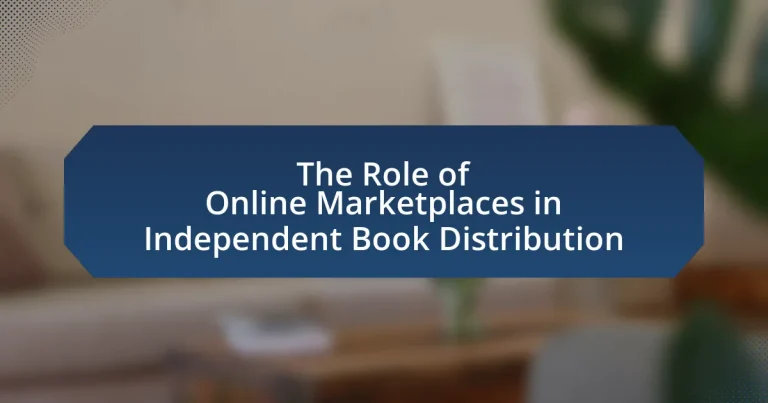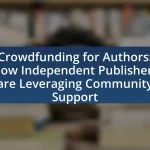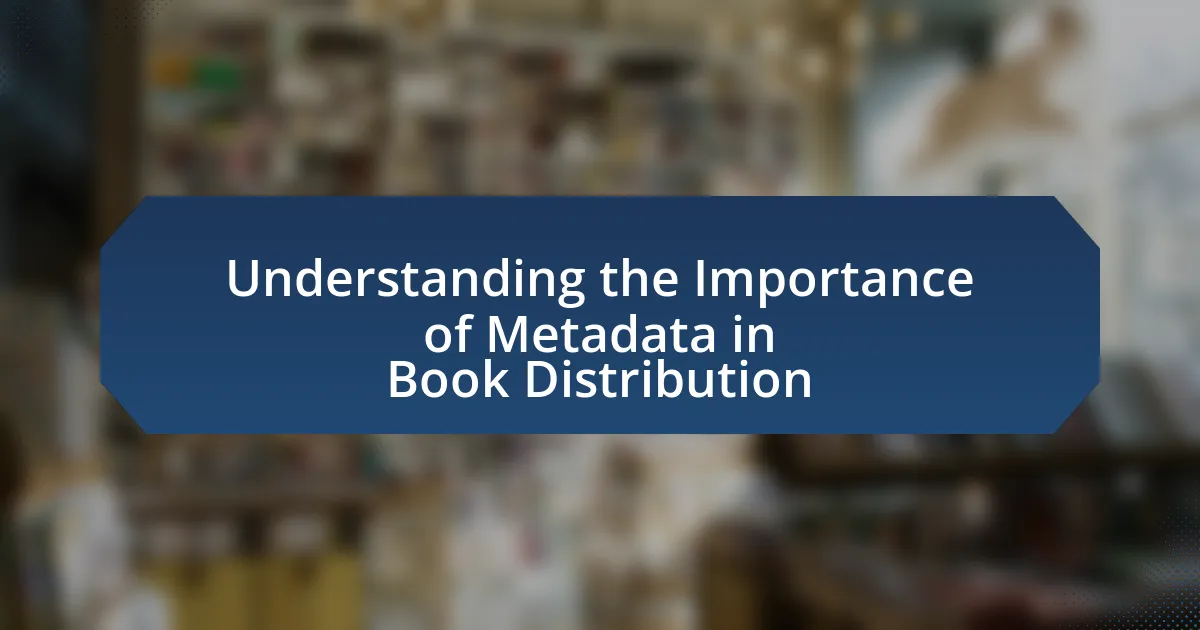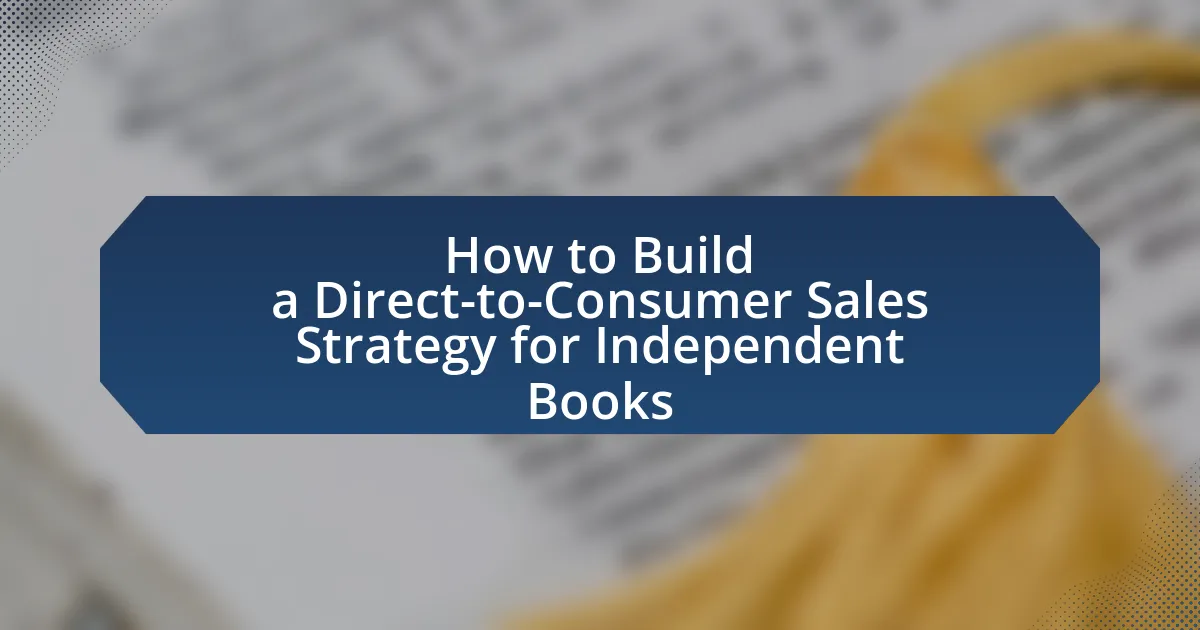Online marketplaces are essential for independent book distribution, providing authors and small publishers with platforms to reach broader audiences without traditional publishing contracts. Key features of these marketplaces include user-friendly interfaces, marketing tools, and analytics that support authors in managing sales and enhancing visibility. The article explores how online marketplaces like Amazon and Etsy facilitate global access to books, compare to traditional distribution methods, and address challenges faced by independent authors. Additionally, it discusses strategies for optimizing listings, leveraging customer engagement, and the future trends shaping the landscape of online book distribution.
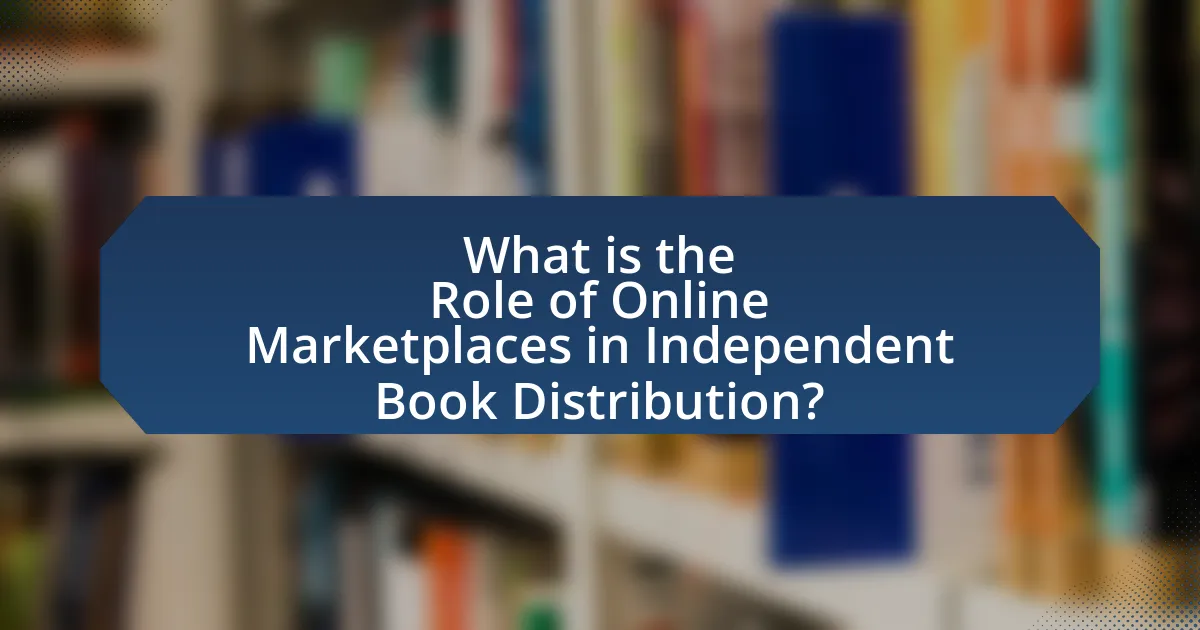
What is the Role of Online Marketplaces in Independent Book Distribution?
Online marketplaces play a crucial role in independent book distribution by providing a platform for authors and small publishers to reach a wider audience. These platforms, such as Amazon, Etsy, and others, enable independent authors to list their books without the need for traditional publishing contracts, thus democratizing access to the market. According to a 2021 report by the Independent Book Publishers Association, over 50% of independent publishers utilize online marketplaces as a primary sales channel, highlighting their significance in the distribution landscape. Additionally, online marketplaces offer tools for marketing, inventory management, and customer engagement, which are essential for independent authors who may lack resources for extensive promotional efforts.
How do online marketplaces facilitate independent book distribution?
Online marketplaces facilitate independent book distribution by providing a platform for authors and small publishers to reach a global audience without the need for traditional retail channels. These platforms, such as Amazon, Etsy, and others, allow independent authors to list their books, manage sales, and handle logistics, thereby reducing barriers to entry in the publishing industry.
For instance, Amazon’s Kindle Direct Publishing enables authors to publish e-books and paperbacks directly, offering tools for pricing, marketing, and distribution. This model has led to a significant increase in self-published titles, with over 1 million books published through Kindle Direct Publishing in 2020 alone. Additionally, online marketplaces often provide analytics and customer feedback, which help authors refine their offerings and marketing strategies.
What are the key features of online marketplaces that support independent authors?
Online marketplaces that support independent authors typically feature user-friendly interfaces, robust distribution networks, and marketing tools. These platforms allow authors to easily upload and manage their works, ensuring accessibility to a wide audience. For instance, Amazon Kindle Direct Publishing enables authors to publish eBooks and paperbacks with minimal upfront costs, reaching millions of potential readers. Additionally, many marketplaces offer promotional tools, such as discount options and advertising services, which help authors increase visibility and sales. According to a 2021 report by the Independent Book Publishers Association, 70% of independent authors utilize online marketplaces for distribution, highlighting their significance in the publishing landscape.
How do online marketplaces compare to traditional distribution methods?
Online marketplaces provide a more efficient and accessible distribution method compared to traditional distribution methods. Traditional distribution often involves intermediaries, such as wholesalers and retailers, which can increase costs and limit access for independent authors. In contrast, online marketplaces like Amazon and Etsy allow authors to reach a global audience directly, reducing overhead costs and enabling higher profit margins. According to a 2021 report by the Independent Book Publishers Association, 70% of independent publishers reported increased sales through online platforms, highlighting the effectiveness of this distribution model.
Why are online marketplaces important for independent authors?
Online marketplaces are crucial for independent authors because they provide a platform for wider distribution and visibility of their works. These platforms, such as Amazon Kindle Direct Publishing and Smashwords, enable authors to reach a global audience without the need for traditional publishing houses. According to a 2021 report by the Independent Book Publishers Association, self-published titles accounted for over 1 million new books published in the U.S. alone, highlighting the significant role of online marketplaces in facilitating access to readers. Additionally, these marketplaces often offer tools for marketing and sales analytics, empowering authors to optimize their strategies and increase their revenue potential.
What challenges do independent authors face in book distribution?
Independent authors face significant challenges in book distribution, primarily due to limited access to traditional distribution channels. These authors often struggle to secure shelf space in physical bookstores, which typically favor established publishers. Additionally, independent authors may encounter difficulties in navigating online marketplaces, where competition is fierce and visibility is often low. According to a 2021 survey by the Independent Book Publishers Association, 70% of independent authors reported that gaining visibility on platforms like Amazon is a major hurdle. Furthermore, the lack of marketing resources and expertise can hinder their ability to effectively promote their books, leading to lower sales and reduced market reach.
How do online marketplaces address these challenges?
Online marketplaces address challenges in independent book distribution by providing a centralized platform for sellers and buyers, enhancing visibility and accessibility. These platforms streamline the purchasing process, allowing independent authors and publishers to reach a broader audience without the need for extensive marketing budgets. For instance, Amazon’s Kindle Direct Publishing enables authors to publish and distribute their books globally, significantly reducing barriers to entry. Additionally, online marketplaces often offer tools for inventory management, sales tracking, and customer engagement, which help independent sellers optimize their operations. According to a 2021 report by the Book Industry Study Group, 30% of independent publishers reported increased sales through online marketplaces, demonstrating their effectiveness in overcoming distribution challenges.
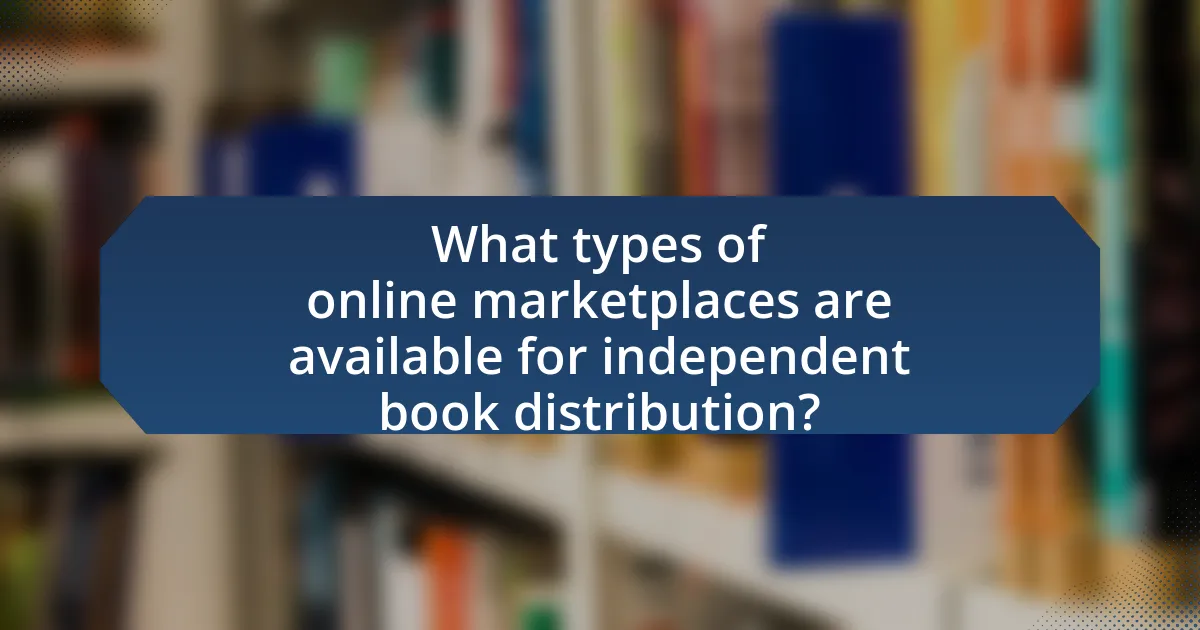
What types of online marketplaces are available for independent book distribution?
Various types of online marketplaces are available for independent book distribution, including general retail platforms, specialized book retailers, and self-publishing services. General retail platforms like Amazon and eBay allow independent authors to reach a broad audience by listing their books alongside mainstream titles. Specialized book retailers, such as Bookshop.org and IndieBound, focus on supporting independent bookstores and provide a platform for authors to sell directly to consumers while promoting local shops. Self-publishing services like Lulu and IngramSpark enable authors to distribute their books in both digital and print formats, offering tools for print-on-demand and global distribution. These marketplaces collectively enhance the visibility and accessibility of independent books, allowing authors to connect with readers effectively.
How do different online marketplaces cater to various genres?
Different online marketplaces cater to various genres by tailoring their platforms to meet the specific needs of diverse audiences. For instance, Amazon offers a vast selection of genres, utilizing algorithms that recommend books based on user preferences and purchase history, thus enhancing discoverability for niche genres. Similarly, platforms like Goodreads focus on community engagement, allowing users to rate and review books across genres, which helps readers find titles that align with their interests. Additionally, specialized marketplaces such as Bookshop.org emphasize independent authors and publishers, promoting genres that may not receive as much attention on larger platforms. This genre-specific approach is supported by data indicating that targeted marketing strategies can increase sales by up to 30% in niche markets.
What are the most popular online marketplaces for independent authors?
The most popular online marketplaces for independent authors are Amazon Kindle Direct Publishing, Smashwords, and Draft2Digital. Amazon Kindle Direct Publishing dominates the market, allowing authors to publish eBooks and paperbacks directly to Amazon, reaching millions of readers. Smashwords offers a wide distribution network to various retailers and libraries, making it a preferred choice for many authors. Draft2Digital simplifies the publishing process and provides access to multiple platforms, including Apple Books and Barnes & Noble. These platforms collectively enable independent authors to effectively distribute their works and reach a broad audience.
How do niche marketplaces benefit specific author demographics?
Niche marketplaces benefit specific author demographics by providing targeted platforms that cater to particular genres or interests, allowing authors to reach their ideal audience more effectively. These marketplaces often attract readers who are specifically looking for unique or specialized content, which increases the likelihood of sales for authors within those niches. For example, a marketplace focused on science fiction may have a dedicated user base that actively seeks out new works in that genre, enhancing visibility for authors who write science fiction. Additionally, niche marketplaces often offer tailored marketing tools and community engagement opportunities, which can further support authors in building their brand and connecting with readers who share similar interests.
What are the advantages of using online marketplaces for book sales?
Online marketplaces for book sales provide significant advantages, including broader reach, lower overhead costs, and enhanced visibility. These platforms allow authors and publishers to access a global audience, increasing potential sales; for instance, Amazon reported that over 300 million customers use its marketplace, showcasing the vast market potential. Additionally, online marketplaces reduce the need for physical inventory and storefronts, which can significantly lower operational costs. Enhanced visibility through search algorithms and customer reviews further boosts sales opportunities, as books can be easily discovered by interested readers.
How do online marketplaces enhance visibility for independent authors?
Online marketplaces enhance visibility for independent authors by providing a platform that reaches a vast audience of potential readers. These platforms, such as Amazon and Barnes & Noble, aggregate numerous titles, making it easier for readers to discover new works through search algorithms, recommendations, and user reviews. For instance, Amazon’s Kindle Direct Publishing allows authors to publish their books directly, increasing their chances of being featured in promotional campaigns, which can lead to higher sales and visibility. Additionally, online marketplaces often utilize data analytics to promote books based on consumer behavior, further amplifying the exposure of independent authors to targeted audiences.
What financial benefits do online marketplaces provide to independent authors?
Online marketplaces provide independent authors with significant financial benefits, including higher royalty rates and broader market access. Authors can earn royalties ranging from 35% to 70% on sales, depending on the platform, which is substantially higher than traditional publishing models that often offer 10% to 15%. Additionally, these platforms enable authors to reach global audiences without the need for physical distribution, increasing potential sales volume. For instance, Amazon Kindle Direct Publishing allows authors to publish and sell eBooks worldwide, facilitating access to millions of readers. This combination of favorable royalty structures and extensive reach enhances the overall earning potential for independent authors.
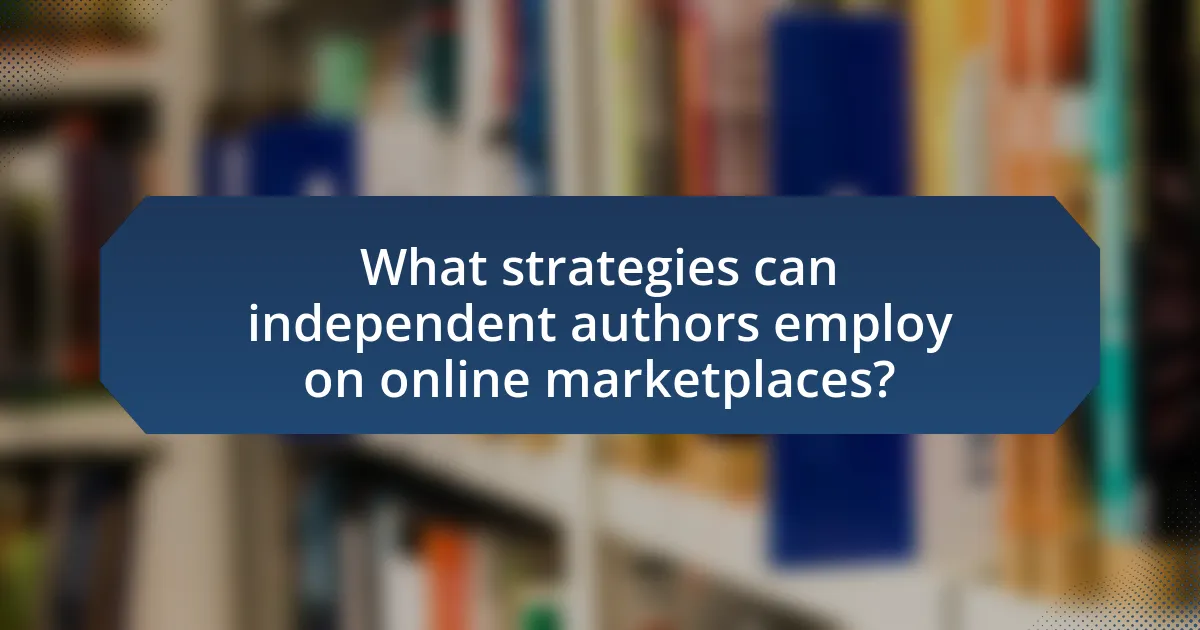
What strategies can independent authors employ on online marketplaces?
Independent authors can employ several strategies on online marketplaces to enhance their visibility and sales. First, optimizing book listings with relevant keywords and compelling descriptions can significantly improve discoverability, as studies show that 70% of consumers use search functions to find products. Second, leveraging social media marketing to build an author brand and engage with potential readers can drive traffic to their marketplace listings, with platforms like Instagram and Facebook being particularly effective for visual content. Third, utilizing promotional tools such as discounts, limited-time offers, and free book promotions can attract new readers and boost rankings within the marketplace. Additionally, gathering and showcasing reader reviews can enhance credibility and influence purchasing decisions, as 90% of consumers read online reviews before making a purchase. Finally, participating in author collaborations or bundles can expand reach and introduce authors to new audiences, thereby increasing sales potential.
How can authors optimize their listings on online marketplaces?
Authors can optimize their listings on online marketplaces by utilizing effective keywords, crafting compelling descriptions, and ensuring high-quality visuals. Effective keywords enhance discoverability, as studies show that 70% of consumers use search terms to find products. Crafting compelling descriptions that highlight unique selling points can increase conversion rates; for instance, listings with detailed descriptions can see up to a 30% increase in sales. High-quality visuals, including professional cover images and engaging promotional graphics, are crucial, as listings with images receive 94% more views than those without. By focusing on these elements, authors can significantly improve their visibility and sales on online marketplaces.
What role do keywords and descriptions play in book visibility?
Keywords and descriptions are crucial for enhancing book visibility in online marketplaces. They directly influence search engine optimization (SEO), allowing potential readers to discover books through relevant search queries. For instance, a study by the Book Industry Study Group found that 70% of readers use search engines to find books, highlighting the importance of well-chosen keywords. Descriptions provide context and entice readers, improving click-through rates and conversions. Therefore, effective use of keywords and compelling descriptions significantly increases a book’s chances of being found and purchased in a competitive online environment.
How can authors leverage reviews and ratings to boost sales?
Authors can leverage reviews and ratings to boost sales by actively encouraging readers to leave feedback and prominently displaying positive reviews in their marketing materials. Positive reviews enhance credibility and attract potential buyers, as studies show that 70% of consumers trust online reviews as much as personal recommendations. Additionally, authors can utilize platforms like Amazon, where higher ratings can improve visibility in search results, leading to increased sales. Engaging with reviewers can also foster a community around the book, encouraging word-of-mouth promotion, which is crucial in independent book distribution.
What marketing techniques are effective for promoting books on online marketplaces?
Effective marketing techniques for promoting books on online marketplaces include optimizing product listings, utilizing social media advertising, and leveraging email marketing campaigns. Optimizing product listings involves using relevant keywords, compelling descriptions, and high-quality images to enhance visibility and attract potential buyers. Social media advertising allows authors to target specific demographics, increasing the likelihood of reaching interested readers; for instance, Facebook and Instagram ads can be tailored to specific interests related to the book’s genre. Email marketing campaigns can engage existing readers and encourage them to share the book with their networks, which can lead to increased sales. According to a study by the Book Industry Study Group, 70% of readers discover new books through online recommendations, highlighting the importance of these marketing techniques in driving visibility and sales on online marketplaces.
How can social media be integrated with online marketplace strategies?
Social media can be integrated with online marketplace strategies by leveraging platforms for targeted advertising, community engagement, and content sharing. Online marketplaces can utilize social media to create targeted ad campaigns that reach specific demographics, enhancing visibility and driving traffic to product listings. Additionally, engaging with customers through social media fosters community and builds brand loyalty, which can lead to increased sales on the marketplace. For instance, a study by Hootsuite in 2021 found that 73% of marketers believe that their efforts through social media marketing have been “somewhat effective” or “very effective” for their business, indicating the potential impact of social media on marketplace success.
What are the best practices for running promotions on online marketplaces?
The best practices for running promotions on online marketplaces include setting clear objectives, utilizing targeted advertising, optimizing product listings, and leveraging customer reviews. Setting clear objectives ensures that promotions align with business goals, such as increasing sales or brand awareness. Utilizing targeted advertising, such as pay-per-click campaigns, can effectively reach specific customer demographics, enhancing visibility and engagement. Optimizing product listings with high-quality images, detailed descriptions, and relevant keywords improves searchability and conversion rates. Leveraging customer reviews builds trust and credibility, as 79% of consumers trust online reviews as much as personal recommendations, according to a survey by BrightLocal. These practices collectively enhance the effectiveness of promotions on online marketplaces.
What common pitfalls should independent authors avoid on online marketplaces?
Independent authors should avoid underpricing their books on online marketplaces, as this can devalue their work and lead to lower perceived quality. Setting prices too low may attract readers but can also result in reduced royalties and a lack of sustainability for the author’s career. Additionally, authors should refrain from neglecting marketing efforts; relying solely on the marketplace’s visibility can limit their reach. According to a survey by the Alliance of Independent Authors, 70% of authors who actively market their books see significantly higher sales compared to those who do not. Furthermore, independent authors must avoid ignoring reader feedback and reviews, as engaging with readers can enhance their reputation and improve future works.
How can authors prevent pricing errors and mismanagement of inventory?
Authors can prevent pricing errors and mismanagement of inventory by implementing automated pricing tools and inventory management systems. Automated pricing tools help authors adjust prices based on market trends and competitor pricing, reducing the likelihood of human error. Inventory management systems track stock levels in real-time, alerting authors when to reorder or adjust listings, which minimizes the risk of overselling or stockouts. According to a study by the Book Industry Study Group, effective inventory management can lead to a 20% increase in sales efficiency, demonstrating the importance of these tools in maintaining accurate pricing and inventory levels.
What are the risks of neglecting customer engagement and feedback?
Neglecting customer engagement and feedback poses significant risks, including decreased customer loyalty and reduced sales. When businesses fail to engage with customers, they miss valuable insights that can inform product development and marketing strategies. Research indicates that companies with strong customer engagement can see a 23% increase in revenue, highlighting the financial impact of neglecting this area. Additionally, ignoring feedback can lead to negative customer experiences, resulting in poor reviews and diminished brand reputation. According to a study by the Harvard Business Review, companies that actively seek and respond to customer feedback can improve customer retention rates by up to 15%. Thus, the risks of neglecting customer engagement and feedback directly affect both customer satisfaction and overall business performance.
What are the future trends in online marketplaces for independent book distribution?
Future trends in online marketplaces for independent book distribution include increased personalization through AI-driven recommendations, enhanced direct-to-consumer sales models, and the integration of multimedia content. Online platforms are leveraging artificial intelligence to analyze consumer behavior, allowing for tailored book suggestions that improve user engagement and sales. Additionally, independent authors are increasingly utilizing direct-to-consumer models, bypassing traditional publishing routes, which has been facilitated by platforms like Amazon and Etsy. The rise of multimedia content, such as audiobooks and interactive e-books, is also becoming prevalent, as consumers seek diverse formats. According to a report by Statista, the global e-book market is projected to reach $23.12 billion by 2026, indicating a growing demand for innovative distribution methods.
How is technology shaping the evolution of online book distribution?
Technology is significantly shaping the evolution of online book distribution by enabling faster, more efficient, and broader access to books. The rise of e-commerce platforms like Amazon and independent marketplaces has transformed how books are sold, allowing authors and publishers to reach global audiences without traditional gatekeepers. For instance, data from the Association of American Publishers indicates that e-books accounted for 20% of total book sales in 2022, highlighting the shift towards digital formats facilitated by technology. Additionally, advancements in print-on-demand services have reduced inventory costs and allowed for a wider variety of titles to be available, further democratizing access to literature.
What emerging platforms should independent authors watch for opportunities?
Independent authors should watch platforms like Substack, Wattpad, and TikTok for emerging opportunities. Substack allows authors to monetize newsletters and build direct relationships with readers, with over 1 million paid subscribers reported in 2021. Wattpad offers a vast community for storytelling and potential publishing deals, with its platform hosting over 90 million users. TikTok, particularly through the #BookTok trend, has significantly influenced book sales, with reports indicating that books featured in popular videos see a substantial increase in sales. These platforms provide unique avenues for independent authors to reach audiences and generate income.
What practical tips can independent authors follow to succeed in online marketplaces?
Independent authors can succeed in online marketplaces by focusing on effective marketing strategies, optimizing their book listings, and engaging with their audience. First, authors should utilize social media platforms to build a following and promote their work, as 70% of readers discover new books through social media. Second, optimizing book listings with relevant keywords, compelling descriptions, and professional cover designs can significantly increase visibility; studies show that well-optimized listings can lead to a 30% increase in sales. Lastly, engaging with readers through newsletters and responding to reviews fosters a loyal community, which is crucial since 90% of consumers trust recommendations from others.
